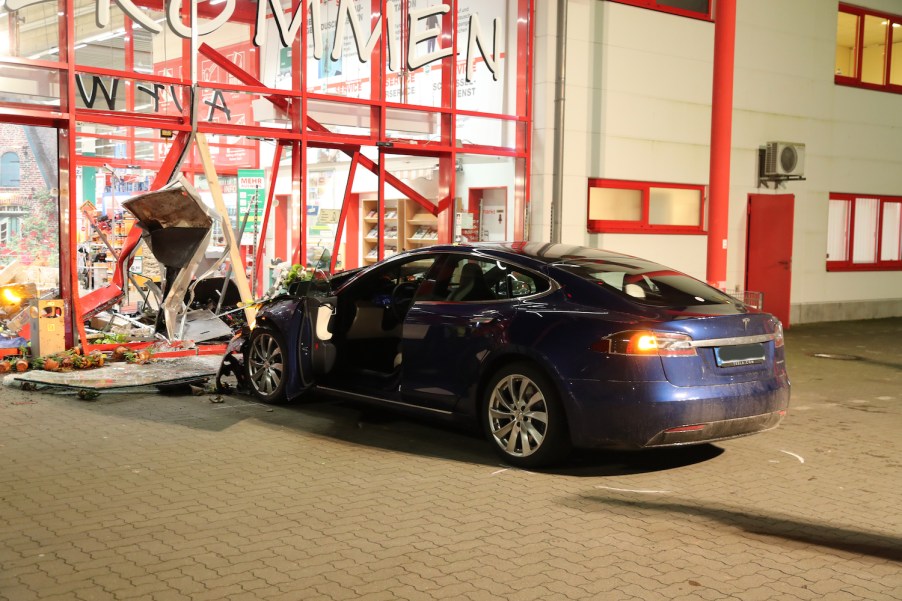
Tesla Refused To Recall Autopilot Cars Crashing Into First Responders, Government Demands Answers
Tesla’s “Autopilot” is an adaptive cruise control and advanced lane-keep system. Teslas using Autopilot have struck at least 12 emergency vehicles parked in the breakdown lane. Unfortunately, one of these accidents proved fatal. With first responders’ lives in the balance, a Tesla Autopilot recall seemed imminent. But Elon Musk refused to recall any vehicles, and now the government is demanding answers.
Tesla recall history

Elon Musk founded Tesla Inc in 2003. He launched his first car, an electric roadster, in 2003. In the past two decades, he has followed the Tesla Roadster with four more models. These are the Tesla Model S, The Model X, The Model 3, and the Model Y. In addition, the Tesla Cybertruck is still in development. Understandably, some of these first cars required recalls.
Early Tesla recalls were picture-perfect, carried out to the letter of the law. But in recent years, Elon Musk’s “rookie” mistakes defined his later recalls. Finally, the CEO revealed he thinks recalls are outdated. We even learned Elon Musk dislikes “recall” as a word.
This year, a deadly Tesla defect caused a dozen accidents. Despite countless lives hanging in the balance, Musk’s hatred of recalls got the better of him and he relied on a software update instead. Consequently, Tesla may find itself in trouble with the government.
Autopilot failures and the NHTSA Tesla investigation

Tesla’s proprietary Autopilot system is a suite of driver aid software. It includes an advanced cruise control that can keep a vehicle under the speed limit while matching the speed of surrounding traffic. It also includes a lane-keep feature that centers the car in its lane.
Autopilot uses a series of sensors and cameras and is available on any post-2014 Tesla. Tesla maintains that Autopilot is a driver aid, not actually an “autopilot” self-driving system. Autopilot is standard, while Full Self-Driving (FSD) mode is a Tesla option.
The National Highway Traffic Safety Administration (NHTSA) received reports of suspicious Tesla crashes throughout 2021. The NHTSA found Teslas were striking emergency vehicles parked in the breakdown lane. The accidents all occurred at night with Autopilot engaged. The software was unable to spot the emergency vehicles’ lights.
Autopilot caused at least a dozen accidents with emergency vehicles. At least 17 people were injured. In one accident, the Tesla’s passenger died. The NHTSA compiled and published a list of accidents, but Tesla did not issue a recall. So in August 2021, the NHTSA opened a Tesla autopilot investigation. The investigation included 765,00 vehicles–according to the Associated Press.
Then, in September 2021, Tesla rolled out the “Emergency Light Detection Update” to the Autopilot software. The automakers obviously hoped it had solved the issue but never issued an official recall. And in doing so, Tesla may have broken the law.
How do I know if my Tesla was recalled?

The United States has a carefully designed recall protocol. The NHTSA collects customer complaints and safety reports on vehicles. If the Administration deems a vehicle unsafe, they contact the manufacturer, and the two collaborate on a solution. The manufacturer’s responsibility is to contact vehicle owners, fix every dangerous car, and keep careful records that they have done so.
There is a system because owners must know if their Tesla was recalled. It is also essential to other motorists–and at-risk emergency personnel–to know that every Tesla on the road is now safe.
Tesla disregarded this protocol and sent an over-the-air software patch on their own. The automaker did not collaborate with the NHTSA on a solution. It did not notify vehicle owners that it had a safety concern. It also did not keep records of which vehicles it mended for the NHTSA to make available to the public.
Because of Tesla’s disregard for protocol, the NHTSA sent a public letter to Tesla. The Administration demanded information on the software update and a list of vehicles updated. It also asked Tesla to give a legal or technical reason for not issuing an official recall. Finally, the NHTSA says Tesla must provide this information under oath or pay a fine of over $114 million.



